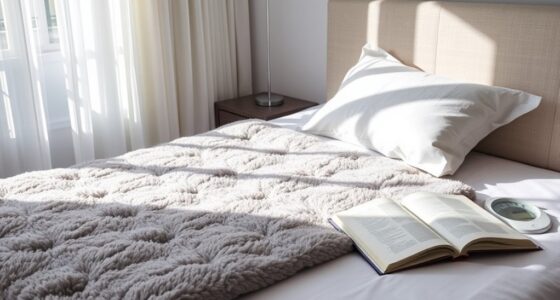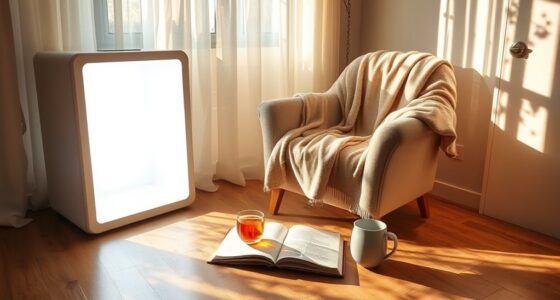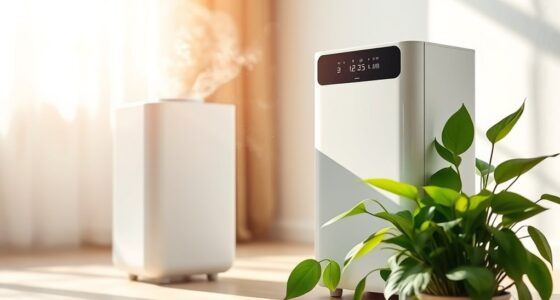To improve your sleep hygiene tonight, start by sticking to a consistent sleep schedule and wind down with relaxing activities. Limit screen time at least an hour before bed and keep your bedroom comfortable—aim for a cool temperature and minimize noise and light. Watch what you eat and drink too; avoid heavy meals and caffeine close to bedtime. Small changes make a big difference, and there’s plenty more you can do to enhance your sleep environment.
Key Takeaways
- Establish a calming bedtime routine by winding down 30-60 minutes before sleep with activities like reading or gentle stretches.
- Limit screen time by turning off devices at least one hour before bed to reduce blue light exposure.
- Keep your bedroom cool, ideally between 60–67°F (15.6–19.4°C), for optimal sleep comfort.
- Create a tech-free zone in the bedroom to enhance natural sleep cues and minimize distractions.
- Avoid heavy meals and caffeine in the evening to prevent sleep disruptions and promote better rest.
Understand Sleep Hygiene Importance

Understanding the importance of sleep hygiene is essential because it directly affects your physical and mental well-being. Practicing good sleep hygiene helps you achieve quality sleep, which is crucial for your overall health. Start by establishing a consistent sleep schedule; going to bed and waking up at the same time every day aids your body’s internal clock. Incorporate a calming bedtime routine filled with relaxing activities like warm baths or gentle stretches to signal your body that it’s time to wind down. Additionally, limiting exposure to blue light at least one hour before bed to prevent melatonin disruption can enhance your sleep experience, as relaxation before sleep plays a significant role in better manifestations. It’s important to recognize that newborn sleep patterns indicate that sleep cycles can last about 50-60 minutes, which can inform your understanding of effective sleep strategies. Furthermore, ensuring good air quality in your bedroom can contribute to a more restful night by reducing allergens that might disrupt your sleep. Finally, create a comfortable environment by adjusting the temperature and minimizing light and noise to improve sleep quality. Preventive care is also important, as addressing sleep issues early can lead to better long-term health outcomes.
Maintain a Consistent Sleep Schedule

A consistent sleep schedule is a key component of good sleep hygiene that can greatly enhance your overall health. By regulating your internal clock, you can considerably reduce daytime sleepiness and improve your mood and cognitive function. Additionally, establishing a healthy sleep routine can also be beneficial for those involved in caregiving journeys, as it helps maintain the energy and focus needed to support loved ones effectively. Creating transforming spaces that promote relaxation can also contribute to better sleep quality, as a supportive mattress can significantly enhance comfort during sleep. Furthermore, maintaining stable routines can help create a sense of security that is crucial for children’s emotional well-being.
Here are three tips to help you maintain a consistent sleep schedule:
- Go to bed and wake up at the same time every day, even on weekends, to reinforce your sleep-wake cycle.
- Aim for 7-8 hours of sleep each night to support ideal sleep duration and overall well-being.
- Adjust your sleep schedule gradually by 15-30 minutes instead of making sudden changes, making it easier for your body to adapt.
Create a Relaxing Bedtime Routine

To create a relaxing bedtime routine, start winding down 30–60 minutes before sleep. Engage in calming activities like reading or gentle stretches, and personalize your routine with techniques that soothe you. Avoid screens during this time to help your body prepare for a restful night. Incorporating practices such as hydration and water intake can also promote better sleep quality. Additionally, using an air purifier can help ensure improved air quality in your bedroom, which may further enhance your sleep experience. The use of a HEPA filter in an air purifier can significantly reduce allergens and improve your overall sleeping environment. Furthermore, establishing a consistent sleep schedule can enhance cognitive function, promoting better mental health and emotional regulation.
Wind Down Activities
As you approach bedtime, winding down with relaxing activities can greatly improve your sleep quality.
Start this process 30-60 minutes before sleep, engaging in calming activities that signal your body to relax.
Here are three effective wind down activities to contemplate:
- Limit electronic devices: Turn off screens at least an hour before bed to prevent blue light from disrupting melatonin production.
- Incorporate relaxation techniques: Try deep breathing exercises or gentle stretches to ease tension and promote calm. Using essential oils like lavender can also enhance relaxation through their calming aroma. Additionally, utilizing air purifiers can significantly reduce allergens and improve indoor air quality, further promoting restful sleep. Research indicates that implementing relaxation techniques can lead to improved sleep duration and quality.
- Create a soothing environment: Dim the lights and play soft music or white noise to enhance your sleep environment. Additionally, consider using an air purifier to reduce allergens and improve air quality in your bedroom.
Personalizing your bedtime routine with these calming activities will help reinforce healthy habits and improve sleep quality.
Personalized Relaxation Techniques
Creating a relaxing bedtime routine can greatly enhance your sleep quality. Begin winding down 30–60 minutes before bed with calming activities like reading or gentle stretching. To create a comfortable and inviting atmosphere, consider investing in cat furniture that can help keep your feline friend occupied, minimizing disturbances during your relaxation time. Engaging in fitness programs can also contribute positively to your overall well-being, leading to better sleep. Additionally, surrounding yourself with non-toxic plants can improve air quality and create a serene ambiance in your bedroom.
Limit exposure to electronic devices, as their blue light can disrupt melatonin production. Incorporate a warm bath to enjoy a rise and fall in body temperature, promoting sleepiness. You can also practice deep breathing exercises or progressive muscle relaxation to relieve stress. Personalize your relaxation techniques by adding what you find soothing, such as guided meditation or soothing music. Engaging in relaxation techniques can help prepare your mind for restful sleep and potentially improve dream recall.
These tailored activities signal to your body that it’s time to unwind, making it easier for you to shift into restful sleep.
Limit Screen Time Before Bed

When it comes to getting a good night’s sleep, limiting screen time before bed is essential.
The blue light from your devices can mess with your melatonin production, making it harder to fall asleep. To improve your sleep quality, try creating a tech-free zone in your bedroom and engage in calming activities instead. Additionally, professional counseling can help address underlying issues that may be affecting your sleep, such as stress from relationship challenges. Incorporating low light office plants in your bedroom can create a soothing atmosphere that promotes relaxation.
Blue Light Effects
While you might enjoy scrolling through your devices before bed, the blue light they emit can disrupt your sleep cycle. This exposure can suppress melatonin production, making it harder to fall asleep and stay asleep.
To improve your sleep quality, consider the following:
- Limit screen time: Turn off devices at least one hour before bedtime.
- Engage in non-screen activities: Read a physical book or practice relaxation techniques to prepare your mind for sleep.
- Establish a tech-free zone: Create a sleep environment free from screens to enhance your body’s natural sleep cues.
Tech-Free Bedroom Zone
To foster a peaceful sleep environment, it’s essential to establish a tech-free bedroom zone.
Electronic devices emit blue light, which interferes with melatonin production and disrupts sleep onset. To improve your sleep hygiene, aim to turn off all devices at least one hour before bed. This simple change enhances sleep quality by promoting relaxation and mindfulness.
Notifications and alerts can disturb your tranquility, often unconsciously, so reducing screen time is vital. If you must use screens in the evening, consider apps that limit blue light exposure, but aim for a tech-free zone whenever possible.
Optimal Device Usage
Limiting screen time before bed is essential for promoting better sleep. Blue light exposure from devices can interfere with melatonin production, making it harder to fall asleep.
Here are some tips to optimize your device usage:
- Turn off electronic devices at least one hour before bedtime to minimize screen time.
- Use blue light filters on devices if you must use them in the evening.
- Silence notifications to prevent disruptions during your wind-down routine.
Creating a tech-free zone in your bedroom fosters relaxation, encouraging better sleep hygiene.
Instead of screens, engage in calming activities like reading or listening to soft music. These practices can help you unwind and ultimately fall asleep easier, leading to a more restful night.
Keep the Bedroom Comfortable
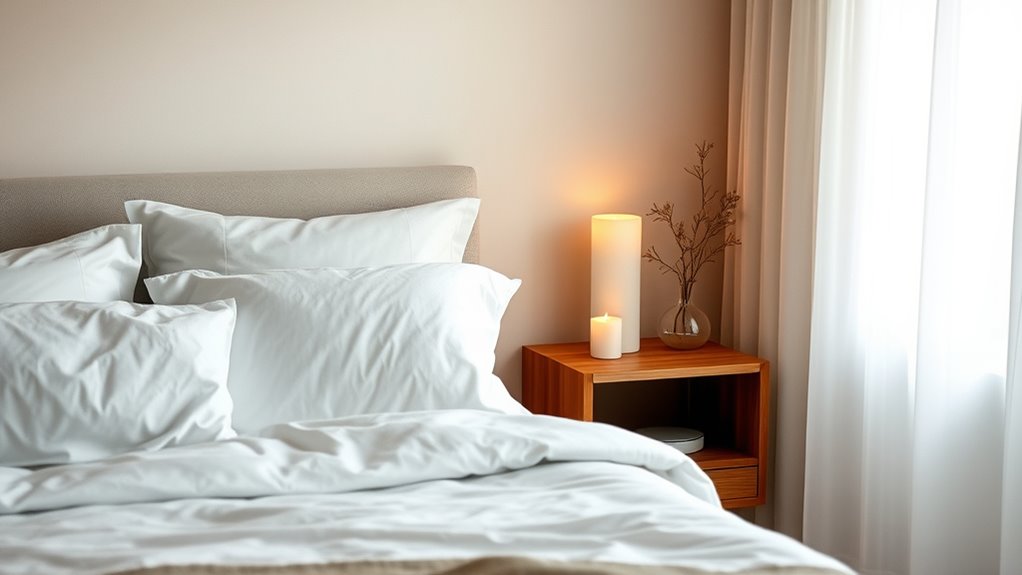
Creating a comfortable bedroom is essential for achieving quality sleep, so consider adjusting a few key elements in your space. Maintain a bedroom temperature between 60–67°F (15.6–19.4°C) to enhance restfulness. Invest in a comfortable mattress and pillows that support your preferred sleeping position. Use blackout curtains to block outside light, promoting better sleep. To minimize noise disturbances, consider using earplugs or a white noise machine for a peaceful environment. Finally, keep your bedroom clean and clutter-free; a tidy space encourages relaxation and improves sleep quality.
| Element | Recommendation | Benefit |
|---|---|---|
| Bedroom Temperature | 60–67°F (15.6–19.4°C) | Enhances restfulness |
| Comfortable Mattress | Supportive and cozy | Promotes better sleep |
| Blackout Curtains | Block outside light | Creates a dark environment |
| Noise Management | Earplugs/white noise machine | Minimizes disturbances |
| Cleanliness | Tidy and organized | Encourages relaxation |
Watch What You Eat and Drink
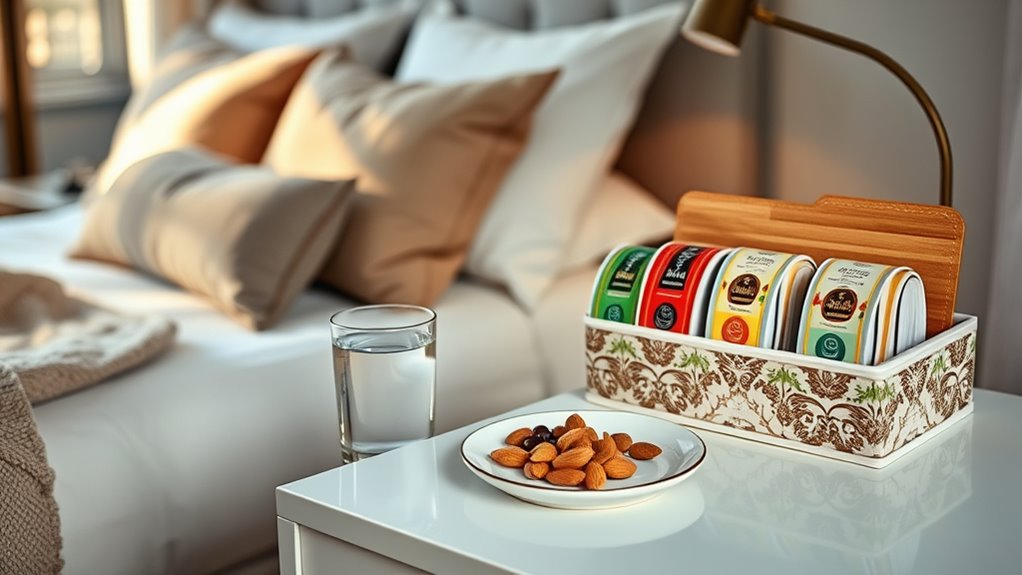
A comfortable bedroom sets the stage for a good night’s sleep, but what you eat and drink can also play a considerable role in your sleep quality.
Here are some tips to help you watch what you eat and drink:
- Limit caffeine intake to morning hours; consuming it later can disrupt sleep.
- Avoid heavy or spicy meals close to bedtime to prevent indigestion.
- Reduce alcohol consumption in the evening, as it may fragment your sleep.
Stay hydrated throughout the day, but limit fluid intake in the hour before bed to minimize nighttime trips to the bathroom.
Also, be mindful of food sensitivities and opt for light snacks if you’re hungry before bed.
Making these adjustments can considerably improve your sleep quality.
Frequently Asked Questions
What Are 5 Tips for Sleep Hygiene?
To improve your sleep hygiene, start by maintaining a consistent sleep schedule; go to bed and wake up at the same times daily.
Next, create a relaxing bedtime routine with calming activities.
Limit screen time before bed to reduce blue light exposure.
Optimize your bedroom environment by keeping it cool, dark, and quiet.
Finally, watch what you eat and drink; avoid caffeine and heavy meals close to bedtime for better sleep quality.
What Is the 10 5 3 2 1 Rule for Sleep?
So, you think you can just crash into bed and drift off? Not so fast! The 10 5 3 2 1 rule for sleep’s got your back.
Start by ditching caffeine 10 hours before bedtime; your restless self will thank you. Avoid heavy meals 5 hours prior, skip vigorous workouts 3 hours before, and say goodbye to screens 1 hour ahead.
Follow this, and you might just wake up feeling like a well-rested superstar!
What Is the 15 Minute Rule for Sleep Hygiene?
The 15 Minute Rule suggests that if you can’t fall asleep within 20 minutes, you should get up and do something quiet and non-stimulating.
This helps prevent frustration and negative feelings about your bed. You might try reading in low light or listening to soothing music until you feel sleepy again.
How to Practice Better Sleep Hygiene?
To practice better sleep hygiene, start by sticking to a consistent sleep schedule—go to bed and wake up at the same time daily.
Create a calming bedtime routine with activities like reading or stretching to signal it’s time to wind down.
Limit screen time before bed, optimize your bedroom environment for comfort, and avoid stimulants like caffeine and nicotine in the hours leading up to sleep.
You’ll notice improvements in your sleep quality!
Conclusion
By weaving these sleep hygiene tips into your nightly routine, you can transform your evenings into a peaceful sanctuary. Think of your bed as a cozy cloud, inviting you to drift into a world of restful dreams. Embrace a consistent schedule and a soothing routine, and watch as the stresses of the day melt away. With a comfortable bedroom and mindful choices, you’re not just chasing sleep; you’re cultivating a tranquil haven for your well-being. Sweet dreams await!


